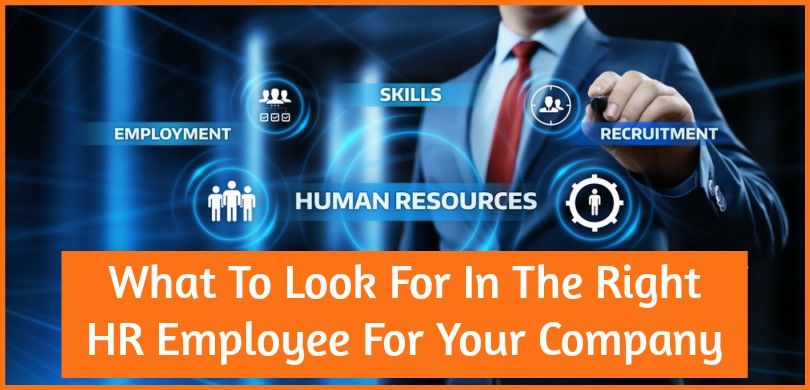
What To Look For In The Right HR Employee For Your Company
Human resources or HR services are better rendered if you have the right people. When it comes to hiring the right HR employees, it’s crucial to consider their credentials, skills, good qualities, and experience. Remember that they will be the ones to handle payroll, workforce hiring and recruitment, onboarding, and strict enforcement of company policies and guidelines.
Below are the important things to look for when hiring HR employees for your company:
HR Employee’s Vision Aligns with Your Company Needs
Before hiring HR employees, you have to assess the key HR positions you need to fill to address the HR needs of your company. The number of HR employees you’ll need depends on the number of current employees you have, HR workload, and the nature and size of your business.
Of course, you have to hire someone who shares the same vision or principles as yours when it comes to people management and administrative tasks. Ask about the HR candidate’s career goals, work principles, and other questions relating to your company’s vision and HR professional career advancement.
Credentials

Human resource professionals don’t have the same educational background. This is why it’s important to also check certifications, affiliations, and other training and seminars attended by HR candidates.
When it comes to career advancement and pay perspective, you have to consider the types of HR certifications the applicant has. If you don’t have any experience hiring HR employees, it’s best to consult professional HR recruitment services, like M&A Exec Search.
Remember that it’s not surprising for HR professionals to possess at least two certificates because some pursue the senior-level certificate following the initial one. Certifying organizations usually offer several HR credentials, which are fairly common.
For instance, The Society for Human Resource Management (SHRM) Certified Professionals may also have a Professional in Human Resource certification provided by the HR Certification Institute (HRCI). If you’re hiring an HR manager, they should have at least three certifications that reflect a higher HR skill level.
Here are the providers of various HR certifications or HR certifying organizations:
- HR Certification Institute (HRCI): This offers several types of HR certificates such as the Senior Professional in Human Resources or SPHR and Associate Professional in Human Resources or APHR.
- The Society for Human Resource Management (SHRM): This is considered a major HR membership organization that is focused on professional development, providing “competency-based’ certification programs for HR professionals.
- World at Work: It is a nonprofit professional association in total rewards and compensation, providing professional development for HR professionals who are involved in delivering total rewards programs.
Skills and Experience
Human resource requires the essential skills required for people management and leadership. As a business executive, you have to look for qualified and skilled HR practitioners. Hire those who have deep knowledge and practical skills to generate more opportunities for your business and your employees.
Here are the fundamental skills that you need to look for in an HR manager:
- Communication Skills: An HR practitioner should be confident in expressing themselves, both in written and oral communication because the HR field would require a lot of talking. The HR manager leads the recruitment process, which involves a series of interviews. Also, HR managers deal with different people every day, listening to work-related and even personal issues of applicants and employees. HR managers also create memos and policy handbooks, which require excellent writing skills.
- Decision-Making Skills: The HR field involves a lot of decision-making daily. For instance, an HR recruiter would need to decide if an applicant fits for the job based on their resume, how the candidate answers questions, and displays their behavior and personality.
- Organizational Skills: When it comes to HR functions, HR practitioners recruit, train, perform appraisals, review and make individual development plans, and deal with employee relations. Hiring an HR manager with organizational skills would mean having the ability to oversee all these functions in a systematic way. Paperwork should be filed systemically, including legal documents and employee profiles. You can ask the HR applicant how they organize their work on their previous job to assess their organizational skills.
- Training and Developmental Skills: HR managers help provide employees with development opportunities. Employee training and development maximize performance or productivity, which is good for your company. Ask the HR candidate about their experience in creating and coordinating employee training and development programs.
- Empathetic Skills: HR professionals deal with employees’ concerns, from salary complaints, benefits, workload, and scheduling issues. This is why it’s paramount to hire empathetic HR employees. Sometimes, employees need someone to listen to them and explain things from the management’s point-of-view. Ask an HR candidate to cite a situation about how they handled an employee’s concern.
Conclusion
Hiring someone responsible to handle your HR department is not easy.
HR professionals need to look after your employees, including their salary, benefits, work-related concerns, and even other issues affecting their work. And because they handle such confidential and private information, it’s a good idea to conduct background checks on your potential hires. Resumes and school degrees may be necessary, yet a thorough background check will tell you what you need to know about whether or not their past has any red flags that could jeopardize their career in your company or put your business at risk.
Once you hire the best HR employees for your company, you’ll ensure that the rights, interests, and well-being of your employees are prioritized. In that way, they’ll remain productive and motivated while reaching your business goals on time.
© New To HR


